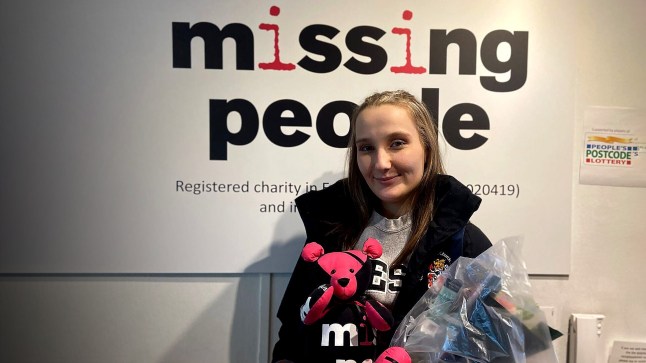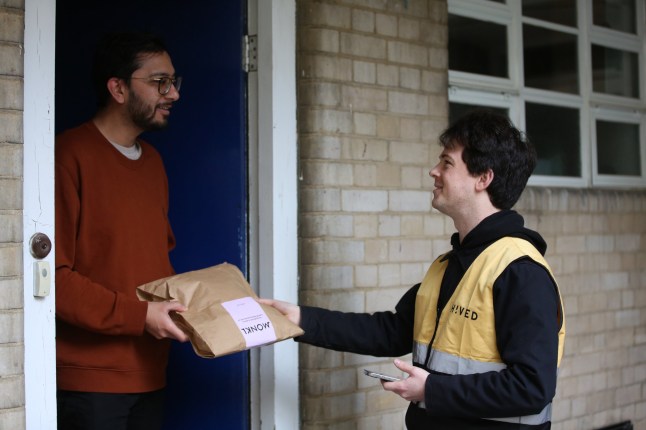
Sat alone in a field, Jade Knight felt like she could breathe for the first time in years – but everybody who loved her felt the exact opposite.
With little more than a book or two housed inside a pink floral bag, Jade had run away for the first time. She was around five miles away from the hospital where she was being treated for serious side effects from her type 1 diabetes.
Nobody knew where she was and that’s what Jade, then 15, wanted.
She had buzzed herself out of the children’s ward while nobody was looking and as soon as it was clear she had disappeared, the police were quickly dispatched in helicopters and cars, along with sniffer dogs. It was around eight hours after the alarm had been raised, that the teen was finally found.
‘As soon as I saw six police officers walking towards me I jumped up and sprinted for my life,’ Jade, now 22, tells Metro. ‘The only female caught me up and I remember her saying “Please stop, you need to go back to the hospital”. I told her I would, but couldn’t guarantee it wouldn’t happen again.’The officers then sat with Jade for 12 hours and even treated her to a much-appreciated Domino’s pizza after months of hospital food. ‘They did what they could to distract me,’ she recalls.
Today, Jade is sitting in a Maidstone cafe – the Kent town is where she calls home now. After recounting the story, she quickly picks her phone up from where she’d placed it on the table minutes earlier. Her finger repeatedly scrolls right on the illuminated screen to show us multiple screenshots of 2018 news articles focused on the disappearance.
Why does she keep reminders of that period of her life? ‘It shows how far I’ve come. Not many stories like mine have a happy ending,’ she says matter-of-factly. ‘The next news article is usually that they have died or you don’t hear from them again, I want to change that.’
Addicted to going missing

The thought of escaping first came to Jade’s mind when she began religiously watching factual shows on people who go missing. She would mentally note how they managed to go undetected by avoiding train stations (‘They have lots of cameras’) and drawing out money before any attempt to go missing (‘You can’t be tracked then’).
Her interest intensified as she found her health battle increasingly difficult. Jade was diagnosed with type 1 diabetes at age eight, then when she entered teenagehood, she was encouraged to be more independent and administer insulin medication – her mum had previously taken on the role.
However, she often felt overwhelmed by the responsibility and didn’t do what she was meant to, which led to frequent hospital stays. ‘I was in denial,’ Jade admits. Soon, her avoidance spilt over into all aspects of her life.She began to skip school, so left with no GCSEs and abandoned horseriding and rollerblading – hobbies that once brought her happiness.
Jade had also enjoyed entering beauty pageants but had to stop after an important part of the selection process clashed with a hospital stay. With so much time spent focused on her health, she didn’t feel she had any friends (‘The closest I had were my nurses’) and a healthy relationship with her ‘wonderful’ parents became fractious.
‘It got so out of control that I didn’t care anymore. I just thought “Why me?”,’ Jade recalls.
Seeing no obvious solution she decided to run away. It became an unhealthy habit that continued for the next two years, with Jade going missing over 50 times in total. Sometimes she’d flee three times in a single week, often for a few hours at a time, while on other occasions, she was gone for days. The teen would ride public transport, stay with strangers she met on the streets or find a hiding place in parks – anything to get her as far away from her home as possible.
Jade fell into a catch-22 situation, where she felt that disappearing was the only way to escape her problems. However, when she returned home, the issues weren’t gone – instead, they often felt bigger so she’d run again. Even small inconveniences such as having her phone confiscated would be a reason to leave. As her parents felt ‘helpless’ and unable to cope, Jade was put into care.
‘I was running away from safe spaces because I was at rock bottom and felt like I had nothing,’ she explains. ‘Running away helped my emotions but I was essentially passing on my troubles to my parents. It was selfish.
‘I wouldn’t take my medication with me so I would be getting more ill while I was away. As I was considered a vulnerable person, every resource was sent out, which I feel bad about, but at the time I needed that.
‘I was addicted to the adrenaline rush of running away,’ Jade admits. ‘It made me feel invincible for a while despite how dangerous it was.’
Sign up to this year’s Metro Lifeline challenge
Someone is reported missing every 90 seconds in the UK. That means life is lonely, scary and uncertain for 170,000 families every year.
Missing People is the only UK charity dedicated to reconnecting them and their loved ones and that’s why this year Metro is proudly supporting them for our 2025 Lifeline campaign.
To help raise vital funds for the charity we would love you to join us on on 3 May for a 25km, 53km or 106km hike on the beautiful Isle of Wight.
Registration starts at just £15 with a fundraising minimum of £240 (25km) / £360 (58km). Alternatively, you can pay for your place and set your own fundraising target.
Whether you want to do it as a group or are signing up solo, as part of Team Lifeline, you’ll receive tons of support and advice, so that every step you take can make a massive difference helping those whose loved ones have disappeared.
Click here to sign up and find out more.
To make a donation to Missing People, please click here.
However, during one incident, Jade was assaulted – something she still struggles to speak about. For years she blamed herself and didn’t initially report it to the police.
Nervously playing with the lid of the jar of sugar on the table in front of her, Jade explains to Metro that if she’d been given a return home interview – essentially a safe space to discuss what had happened once someone has been found – she may have told someone a lot earlier.
‘I reported the crime two years later and it wasn’t possible to get the CCTV which could have helped the case. Things could have been different,’ she says. ‘It wasn’t my fault, and I realise that now.’
Breaking the cycle

In 2020, while sitting on a beach in Margate, watching the sunrise above the horizon, Jade felt finally ready to change. She was in the midst of a nine-month stay in a nearby hospital after she’d gone into a diabetic coma and ended up on life support, and decided to do her usual flit.
However, as she solitarily passed her time – as she had done many times before – something felt different. ‘I was like “I’m done” and that was it,’ Jade remembers of that hot August day.
On her own accord, she returned to the hospital – something that had never happened before – and vividly remembers the shock on the nurses’ faces when she returned without a police officer on either side of her.
‘I ended up hating going missing and the only reason I was doing it is because it had become a habit,’ Jade explains.
There wasn’t one thing that made her stop running but instead multiple factors. One was that she knew being on the verge of adulthood meant that there wouldn’t be as much urgency to find her – ‘I thought “crap, maybe I don’t want to go missing, maybe I just want help”.’
She also began to imagine a potential future beyond her teenage years. ‘I finally realised that while you can’t control what happens to you, you can control how you react,’ Jade adds.
Feeling listened to by the charity Missing People who’d reached out to her through a text was also a big contributor. The teen had begun calling them when she was considering going missing. The phoneline support worker wouldn’t tell her not to run away, but instead listened to why she wanted to escape. Subtle tactics were employed to ensure the teen didn’t make impulsive decisions such as encouraging her to make a cup of tea or watch a TV show, and the desire to run would often pass.
Inspiring others

Now living in Maidstone, Jade says she is living a happy life. ‘My bad days are the equivalent of my good days back then,’ she says. It’s evident by the wide smile that spreads across her face whenever she talks about her current circumstances. She has a job as an emergency care assistant, runs marathons, and has a home that she actively wants to spend time in.
After our meeting, she’s planning on returning to her garden to enjoy the afternoon sun. She’s also got the complete support of her loved ones as she embraces this new phase of life.
‘My mum is my biggest supporter now. We only talk about what happened when my parents want to highlight how far I’ve come,’ she proudly explains. ‘It took time for them to realise it was over but patience was key to us being okay again.’
Jade is also an ambassador for Missing People, and trains officers on speaking to people who’ve disappeared. ‘My overall advice is always to treat them like a human. They may be a number to officers but for the person who’s gone missing, this is the biggest thing going on in their lives,’ she says.
‘You can’t force someone to stop going missing, you just need to support them and keep them safe until they decide to return home.’
Currently, one person is reported missing every 90 seconds, according to the charity and Jade wants to change that statistic. Recently she met a young girl, whose story had striking similarities to her own. She’d just been found after going missing for the 20th time when she was connected with Jade.
‘All people need is someone to listen to them, so we had a nice conversation,’ she explains. ‘It’s been months and she hasn’t run away since. Now, she has a future like I do.’
Do you have a story you’d like to share? Get in touch by emailing Josie.Copson@metro.co.uk
Share your views in the comments below.


